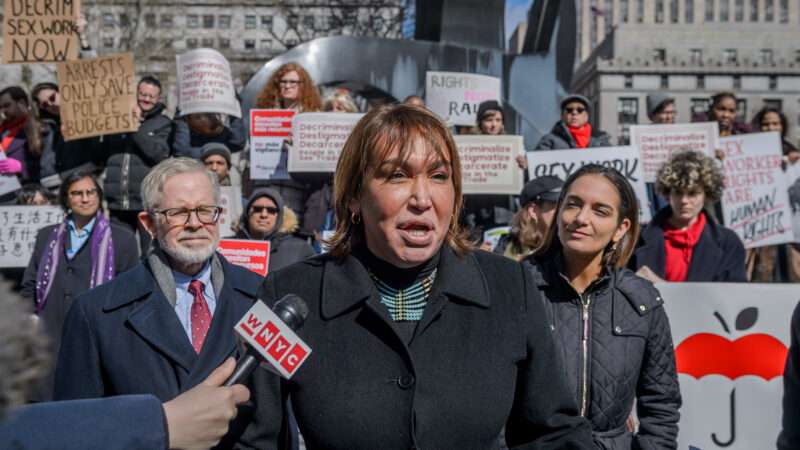
A federal indictment unsealed this week charges two men, Antonio Venti and Michael Kuilan, with supplying the drugs that killed transgender activist Cecilia Gentili on February 6. Among other things, Venti and Kuilan are accused of causing Gentili's death by distributing a mixture of heroin and fentanyl, a felony punishable by a mandatory minimum of 20 years in prison and a maximum of life.
Gentili "was tragically poisoned in her Brooklyn home from fentanyl-laced heroin," says Breon Peace, the U.S. attorney for the Eastern District of New York. "Fentanyl is a public health crisis. Our Office will spare no effort in the pursuit of justice for the many New Yorkers who have lost loved ones due to this lethal drug." The indictment "delivers a strong message to anyone who profits from poisoning our communities with illicit drugs," New York City Police Commissioner Edward Caban adds. "It is imperative that we continue to hold distributors accountable for their callous actions."
That self-righteous stance is pretty audacious given the role that drug warriors like Peace and Caban played in killing Gentili. If Venti and Kuilan were "callous," how should we describe public officials who are dedicated to enforcing laws that predictably cause thousands of deaths like this one every year?
Those laws create a black market in which the composition and potency of drugs is uncertain and highly variable. They also push traffickers toward highly potent drugs such as fentanyl, which are easier to conceal and smuggle. As a result, drug users like Gentili typically do not know exactly what they are consuming, which magnifies the risk of a fatal mistake. The "poisoning" that Peace and Caban decry therefore is a consequence of the policies they are proudly enforcing in this very case.
In this context, it would be perverse to hold Gentili responsible for causing her own death. Peace and Caban instead blame Venti and Kuilan, which might seem more plausible until you consider the complexities of illicit drug distribution. As the Drug Policy Alliance (DPA) notes, "People who sell drugs rarely know the exact contents of their drug supply or a given dose. Research shows drug mixing is typically done at much higher levels of the supply chain."
It seems quite unlikely that Venti, who allegedly sold drugs to Gentili, knew exactly what the powder contained. Kuilan might be more culpable, since Peace's office says police "found hundreds of baggies of fentanyl" in his Brooklyn apartment. The New York Times reports that the bags contained "approximately 30 grams of the drug," which prosecutors said "was enough to administer lethal doses to several thousand people."
The implication seems to be that Kuilan produced the "fentanyl and heroin mixture" that Gentili took. But the statement from Peace's office does not mention any discovery of heroin separate from fentanyl, and both men are charged with distributing the mixture.
In any event, neither Kuilan nor Venti intended to kill Gentili. Yet the mandatory penalties they face are much more severe than the federal penalties for voluntary or involuntary manslaughter and New York's penalties for criminally negligent homicide. That distinction hinges on the legal status of the drugs they sold, as opposed to their culpability in Gentili's death.
Prosecutions like these make a mockery of justice. "Drug-induced homicide laws, mandatory minimum laws, and other severe penalties that people face when they sell or share drugs that result in a fatal overdose primarily punish people involved with low-level selling who often use drugs themselves," DPA notes. The Times reports that Venti, who was previously convicted of "petty larceny and attempted drug sales," is an electrician who has "struggled with drug addiction." Even drug users who merely share purchases with friends or relatives have been prosecuted for causing their deaths.
These attempts to convert accidental overdoses into homicides are dangerous as well as morally dubious. They "cost lives because fear of prosecution deters people from seeking help in an emergency," DPA argues. "Drug-induced homicide prosecutions may have the unintended consequence of people failing to seek medical help in a drug overdose situation, resulting in increased likelihood of death."
Prohibition, in short, creates the hazard that killed Gentili. It compounds that hazard by fostering the use of additives such as fentanyl and xylazine (which was also detected in Gentili's blood). And it makes the resulting overdoses more perilous by discouraging prompt intervention. The answer, according to Peace and Caban, is zealous enforcement of the same laws that produced this disaster.
Frank Tarentino, special agent in charge of the Drug Enforcement Administration's New York Division, concurs. "Fentanyl is a deadly drug that dealers mix into their product and has accounted for 70% of drug related deaths nationwide," he says. "Drug poisonings take too many lives too soon from communities nationwide and DEA is committed to bringing to justice those responsible." If Americans truly demanded accountability from "those responsible" for drug-related deaths, they would start with the politicians and law enforcement officials who are perversely committed to making drug use as dangerous as possible.
The post Drug Dealers Did Not Kill Cecilia Gentili. Prohibition Did. appeared first on Reason.com.







